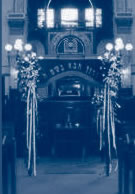|
SEDRA : Masei Hertz Chumash P.702 Numbers
Chap 30
This week's Sedra is generously sponsored by Graeme Berkovitvh.
SYNOPSIS:
The subject of vows and the manner in which they were binding
is discussed. Special reference is also made to the vows made
by women before, during and after marriage and the nature
and extent to which they are bound by them.
The attack on the Midianites was made by twelve thousand
Israelite warriors, one thousand men from each tribe. They
were accompanied by Pinchas, who had played a pivotal role
in halting the plague and the incidents which led to the war.
As the MASHUACH MILCHAMA - war chaplain - he took with him
the holy vessels, and trumpets for sounding the battle alarm.
During the war, every male Midianite was slain, including
the five kings of Midian and the soothsayer Bilam ben Beor.
The victors took the women, children, cattle and other possessions
of the Midianites with them as spoil. Moses though, reprimanded
them for keeping alive the women, who had been the cause of
the plague on Bnei Yisrael. The soldiers, having become defiled
by contact with the dead, were required to stay outside the
camp for seven days to undergo the ceremony of purification.
All their garments and utensils were purified in accordance
with the rules laid down by Elazar the Kohein Gadol, which
he had learned from Moses. The spoils were then divided equally
between all those who had gone to war on the one hand, and
the remainder of the congregation on the other. The cooking
utensils which were part of the spoil were purified according
to special rules which are the source of the laws of "KASHERING"
vessels to this very day. The soldiers contributed one-five
hundredth of their spoils to the Kohanim, while the non-combatants
gave one-fiftieth of their share to the Levi'im. The returning
warriors, thankful that not one them had perished during the
battle, made an additional free-will offering to the Sanctuary
consisting of the golden ornaments that they had captured.
The tribes of Reuven and Gad and half of Menashe possessed
large herds of cattle and sought permission to settle in the
pasture land of Gilad, on the east of the Jordan. Moses at
first disapproved of this plan. He feared that if these two
and a half tribes remained behind during the conquest of Canaan,
the other tribes might lose heart. However, when the Reuvenites
and Gadites explained that they intended to cross the Jordan
and fight in the advance guard with their fellow Jews while
their families remained in Gilad, Moses changed his mind.
He charged Joshua with making sure that this promise be fulfilled.
Otherwise these tribes would forfeit any claims they might
have had to settling in Gilad. Joshua and Elazar the Kohein
Gadol, were entrusted with the equitable allotment of the
land. The Levites were not given separate territory but were
instead granted forty-eight cities on both sides of the Jordan.
The design of these cities represents an interesting excursus
in town planning, particularly the "green belt"
surrounding each city.
Six of these Levitical cities, three on each side of the
Jordan, were designated as Arei Miklat (Cities of Refuge)
besides the other forty-two minor Arei Miklat. They would
provide asylum for whoever killed another person accidentally,
allowing him to escape any vengeful acts of the dead man's
relatives. Following an accidental murder, the perpetrator
could flee to one of the Arei Miklat where he would be brought
before a judicial tribunal. If the judges decided that this
was a case of wilful premeditated murder the sentence was
death. On the other hand, if the murder was unplanned and
without evil intent, the perpetrator would have to stay in
the City of Refuge until the death of the Kohein Gadol. Even
a wilful murderer could not be condemned to death unless there
were two eye witnesses to incriminate him. The wilful murderer
could not have his death sentence commuted by means of monetary
payment, nor could the accidental murderer escape exile in
the City of Refuge through the payment of ransom money.
Leaders of the family of Gilad from the tribe of Menasheh
raised the problem of land inherited by daughters, such as
those of Zelophchad. If these daughters married into another
tribe, their property would go with them rather than stay
within the rights of their original tribe. This would lead
to the reduction of that tribe's holdings. This problem was
solved with the decision that, in such cases, an heiress should
marry a member of her father's tribe. This is what occurred,
in fact, in the case of the daughters of Zelophchad, who married
within their own tribe. This law applies only for that generation.
HAPHTORAH HERTZ CHUMASH P 725 Jeremiah Chap 2.
This is the second of the three Haptorot of Rebuke preceding
Tish'a B'av. It recounts Israel's ingratitude to G-d; Israel's
faithlessness and reliance on alliances with foreigners which
are of no benefit; Israel's continued idolatry. All these
failures can be overlooked if Israel will only return to G-d.
TELL ME RABBI .... HAZAK ! HAZAK ! V'NITHAZEK !
When the last sentence of each of the Five Books of the Torah
is about to be read, everyone rises in anticipation of proclaiming
at the end of the reading:
"Hazak hazak v'nithazek !"
"Be strong! be strong! and let us be strengthened (in
our efforts)".
This is a cry of encouragement to continue with the reading
of the next Book, and to return to this one again in due course.
The triple use of "hazak" may symbolize the past,
present, and future.
The inspiration for saying these words in connection with
finishing a section of the Torah may have come from the Talmudic
dictum that "Four (elements) need to be strengthened
(in Man): Torah, good deeds, prayer, and occupation (derekh
eretz)" (Berakhot 32b).
The scriptural basis for this saying lies in the following
verses :
To be strengthened in TORAH : "Only be strong and very
brave so that you may observe all the Torah that Moses My
servant commanded you". (Josh.1:7)
To be strengthened in PRAYER : "Be strong and let your
heart be brave, and hope in the Lord". (Psalms 27:14
Penitential Psalm - Siddur p.90)
To be strengthened in GOOD DEEDS AND DEREKH ERETZ : "Be
strong and let us strengthen ourselves for our people and
for the cities of G-d". (Sam II 10:12)
BACK TO SHABBAT SHALOM
TABLE
|








